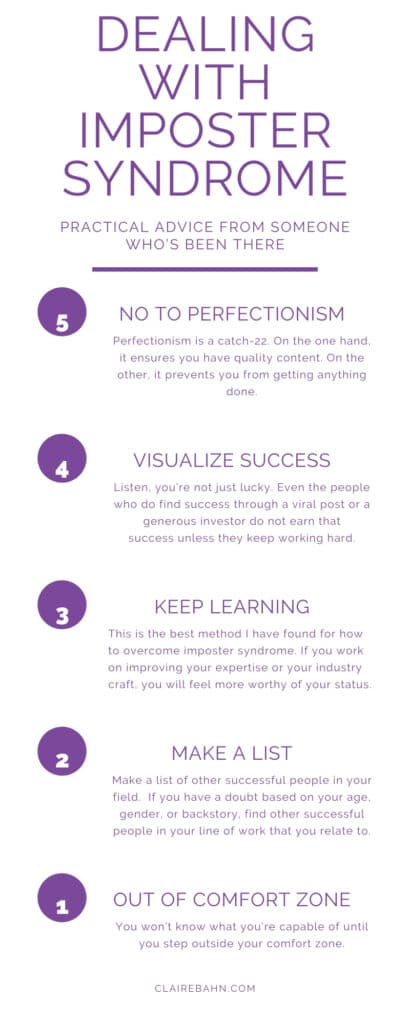Learning how to overcome imposter syndrome was not an overnight success for me. How fitting, right?
When you’re dealing with imposter syndrome, you are constantly questioning yourself. You are always wondering what you can do to improve or you’ll ask what you did to deserve something.
While this feeling is generally associated with your career, you can experience imposter syndrome in your dating life, your travel experiences, and even on social media. For example, if you get to travel more than the average person, you might start thinking that you don’t deserve to be doing this. Traveling is largely considered a luxury you might question why you get to experience this more than others. If you grew up without that close bond with your friends and family, you may think that your partner is “too good to be true” or that you don’t deserve someone so loving and thoughtful.
Do you want to attract more clients and boost revenue?
I didn’t find myself asking, “what is imposter syndrome” until a few steps into my role as CEO for Online Profile Pros. When imposter syndrome hits you, you’re left feeling debilitated, scared, and you immediately want to quit. But before you run back to your nine to five, I urge you to try my 6 steps on how to overcome imposter syndrome.
RELATED: How I Started My Business From Scratch
What is Imposter Syndrome
The best definition I’ve read on imposter syndrome reads:
“a psychological term referring to a pattern of behavior where people doubt their accomplishments and have a persistent, often internalized fear of being exposed as a fraud.”
Some words that can help describe what imposter syndrome feels like are :
- Unqualified
- Fraud
- Unworthy
- Fake
- Phony
- Lucky
Clinical psychologists, Pauline Rose Clance and Suzanne Imes identified imposter syndrome in 1978. At the time, women predominately felt this obscure phenomenon. This is largely due to “sex-role stereotyping” as Clance and Imes say in their paper on imposter syndrome in high achieving women.
But nowadays, even men are more willing to admit this feeling of unworthiness. I believe that more people are experiencing this simply because everyone’s lives are so exposed on social media. A simple glimpse at someone’s Instagram following will leave you feeling less successful and less worthy of your own status. Likewise, that same Instagrammer with a large following might feel like they owe their success to luck instead of the countless hours and hard work they did to build their audience.

Signs You’ve Been Experiencing It
Dealing with imposter syndrome can be difficult. It can start off with a simple nagging feeling but it can escalate to complete dread. If you let it impact you long enough, it can start to limit what you do and you can hinder your own achievements.
Here are some signs that you are dealing with imposter syndrome:
- You’re constantly devaluing your work (giving too much away for free, rethinking your strategy and prices, etc)
- Comparing yourself to others in your field is a daily (bad) habit.
- You always cite the help you receive when someone compliments your progress.
- Minimizing language is a staple in your vocabulary (“I think,” “kind of,” “I’m not sure,” etc)
If you’re still not sure whether or not you’re battling this unwarranted feeling, you can take Clance’s test for imposter syndrome.
My Experience
I have dealt with imposter syndrome a few times during my career. The feeling became very real when I had to pitch my business, Online Profile Pros, to investors. While I knew my business inside and out, and I knew there was no one better suited to pitch the company, I had a lot of doubts and nervousness. I felt much more comfortable running the business and being the customer-facing CEO of the brand. Being in a room with other founders and investors with their buzzwords and false bravados made me feel small and unsure of myself.
I mentioned this to one of my mentors, former CEO of eHarmony, Grant Langston. He mentioned that he has dealt with this during his career as well. It made me feel much better knowing that I was not alone in this feeling. That’s why I wanted to write this blog. In case you are dealing with this, I want to be able to help by letting you know that you are not alone and that there are ways to deal with it successfully.
How to Overcome Imposter Syndrome
The best method I found to deal with imposter syndrome for that specific moment was to keep learning. I learned how to perfect my pitch, improved my pitch deck, and learned all the investor related buzzwords backward and forwards.
However, I have come to find out that there is no one-size-fits-all strategy for how to overcome imposter syndrome. Each situation will need to be handled differently, which is why I’m giving you 6 of my personal steps on how to overcome your imposter syndrome.
After that — honestly — you can just fake it until you make it.

RELATED: 10 Networking Tips to Kick-A$$ at Your Next Networking Event
6. Let Go of Perfectionism
Perfectionism is a catch-22. On the one hand, it ensures you have quality content. On the other, it prevents you from getting anything done.
I can tell you from personal experience that holding on to perfectionism is going to damage your progress as an entrepreneur.
So here’s what you need to do. Get out a piece of paper, a sticky note, or maybe just use your notes app. Write this down:
I won’t be good at everything.
You need to be able to admit that you can’t be good at everything. It’s unrealistic and it’s unhealthy.
In fact, you should seek constructive criticism when it comes to your aspirations. Don’t be afraid to ask for advice from your colleagues or even your followers! If the idea of letting go of perfection immediately makes you hesitate, look at it this way: you will improve with insight from your audience.
When you ask for help and advice from others, it actually keeps you grounded. As I have said many times when it comes to developing your personal brand, you need to showcase your struggles. And if this is one of them, let people know. It makes you relatable which helps to augment your like, know, and trust factors.
5. Ask For Client Reviews and Feedback
I’m saying this again just because I know that it is vital to your career as an entrepreneur. If you want to know how to overcome imposter syndrome, this is what you need to do:
- Ask for client reviews (remember that they won’t all be glowing)
- Seek constructive criticism
Earlier, I mentioned my conversation with Grant Langston, one of my mentors. Without getting his expert advice on what I had been doing right (and wrong), I would have never pushed forward.
Once, one of my board of directors, Scott Sullivan, gave me extremely valuable constructive criticism on my pitch and pitch deck. He has 25+ years of experience in sales and seeking funding. He ended up being instrumental in helping me fine-tune my pitch.
But aside from feedback from your mentors and colleagues you absolutely need to be getting information from your ideal client. They are, ultimately, going to be what makes or breaks your business. How will you know if there is a glitch in your system or if your website copy doesn’t make sense if you don’t ask?
RELATED: How to Take Constructive Feedback to Improve Your Bottom Line
More than likely, people will be happy to tell you what you need to know. By constantly allowing these types of reviews, you are
- Accepting that you have faults, and
- Confirming that your clients are invested enough in your brand to help you out.
Impostor syndrome expert Valerie Young said it best,
“Learning to value constructive criticism, understanding that you’re actually slowing your team down when you don’t ask for help, or remembering that the more you practice a skill, the better you will get at it can all help.”
4. Visualize Your Successes
Listen, you’re not just lucky. Even the people who do find success through a viral post or a generous investor do not earn that success unless they keep working hard.
Those who don’t take their “luck” seriously will fail within years. Those who do, work to make their business bigger and better.
You’ll know you are in the latter group if you routinely visualize your successes.
I like to keep a list of my accomplishments. You can do this in your Notes app, on a corkboard, a whiteboard, or in a spreadsheet. Other’s will call this strategy their Gratitude Journal. Either way, just make sure you can refer to this list on a daily basis. In order to deal with imposter syndrome, you may need this reminder in order to reaffirm your accomplishments. They can be big or small.
Start with these:
- How many hours do you work a week? (it’s okay to take pride in your vigorous work ethic)
- What’s your highest sale to date?
- What’s the best client review you have received?
- How many positive reviews have you received?
- How many people reach out to you for advice daily?
- When was the moment you knew your business could support your family?
And don’t be afraid to showcase your success! What may feel like imposter syndrome to you can be an inspiration to others. Share client reviews on your website and on Instagram. Let people see how many people have subscribed to your Youtube channel, how many have downloaded your app, or how many people you have for your subscription service. Everyone likes to hear good news, and your story is no exception.
3. Keep Learning
This is the best method I have found for how to overcome imposter syndrome. If you work on improving your expertise or your industry craft, you will feel more worthy of your status.
This goes hand-in-hand with letting go of perfectionism. Just like you can’t do everything, you also can’t know everything. Every entrepreneur, no matter their stature, should be learning new ways to expand their business. You won’t get anywhere if you don’t look for ways to get ahead.
If you work on improving your craft, you will feel more worthy of your status. Keep researching your industry’s latest trends, statistics, and leaders if you want to gain enough confidence to deal with imposter syndrome.
Here are a few ways you can do that:
- Sign up for email newsletters from high-authority news sources related to your niche.
- Actually read the newsletters.
- Take classes: local workshops, university classes, and even social media masterclasses can bring you up to speed.
- Share what you learn on your own platforms. Mold it so that it fits your brand, your voice, and your unique perspective on what you’ve learned.
- Make it a habit to read 1-2 news articles a day on your profession.
2. Make a List of Other Successful People in Your Field
If you have a doubt based on your age, gender, or backstory, find other successful people in your line of work that you relate to. Generally, these people will either share the same hindrances as you, or they will have advice on how to overcome imposter syndrome.
This is also a great way to connect with like-minded individuals. Remember that community is greater than competition. By reaching out to others in your profession, you can potentially garner the support you need. And what better way to exert your doubts than by talking to people who understand what you do for a living?
You can also simply make a list of other successful entrepreneurs in your industry and try and figure out what they did to succeed. Read their blogs, follow them on social media, and watch their videos. If their personal branding is done right, you’ll be able to learn their story.
Once you’ve done that, make note of what you’ve done that is the same or equal to their steps. You’ll be surprised how much you have in common.
1. How to Overcome Imposter Syndrome: Step Outside Your Comfort Zone
You won’t know what you’re capable of until you step outside your comfort zone. Here are a few ways you can do that:
- Build a personal brand; let people see the real you.
- Shamelessly tell your story through your content
- Consistently promote yourself and your business — don’t even think whether or not it’s bothering people because those people are not your ideal client.
- Record yourself for IGTV or Instagram Stories to share your expertise
- Attend networking events and industry conferences— don’t leave without pitching yourself to at least 5 people.
- Apply to be a speaker at local events.
Each of these are hurdles you will need to overcome as you see more success as an entrepreneur. But you will become more confident the more you practice and the more you put yourself in situations that you’re uncomfortable with.
If you’re still feeling like an imposter while putting yourself out there, here’s my final piece of advice— fake it ‘till you make it.
NEXT: Personal Brand Statement Examples & Tips to Create Your Own
Conclusion
Ultimately what it all comes down to is just be nice to yourself. You don’t need anyone else to validate your success. You need to do that on your own.
It will take time and it will take constant effort (just like your business!). But you won’t be able to convince anyone else that you’re an expert if you can’t even convince yourself.







